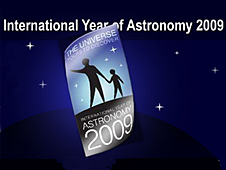NASA Launches IYA 2009 Web Site
05.20.08

Discover the universe with NASA during the 2009 International Year of Astronomy. Image Credit: NASA
In 1609, an Italian scientist named Galileo Galilei became the first known person to study the stars and space through a telescope. Galileo soon discovered sunspots, the moon's mountains and valleys, Saturn's rings, and four moons of Jupiter. His observations showed that the sun -- not Earth, as originally believed -- was the center of the solar system.To celebrate the 400-year anniversary of Galileo's historic gaze into the night sky, 2009 has been proclaimed the International Year of Astronomy by the International Astronomical Union and the United Nations. NASA's newly launched IYA Web site highlights news, events, resources and mission discoveries related to the IYA.
Students, teachers and the public can visit the Web site for the following:
Monthly Features -- A different topic will be highlighted each month of 2009, ranging from telescopes to the solar system to galaxies to black holes.
Calendar and Events -- A calendar that is searchable by date, topic, target audience and region will feature opportunities for educators, including IYA-related workshops, conference presentations and online courses. Community events, such as star-viewing parties and the unveiling of images from NASA spacecraft, will also be listed.
Resources -- Educators, students and the public are encouraged to browse a variety of multimedia resources that feature NASA space science research. NASA will also sponsor a series of radio programs and podcasts around the topic "Are We Alone?"
Mission Discoveries -- Astronomy has come a long way since Galileo first looked at the universe through a telescope 400 years ago. Learn how NASA and its missions have contributed significantly to the history of astronomy.
NASA's IYA Web site supports the IYA 2009 goal to spread awareness of astronomy's contributions to society and culture, stimulate young people's interest in science, portray astronomy as a global peaceful endeavor, and nourish a scientific outlook in society.
Related Resources
International Year of Astronomy 2009 →